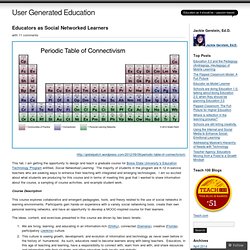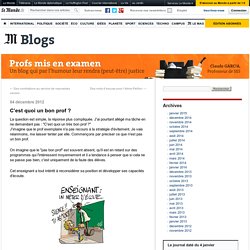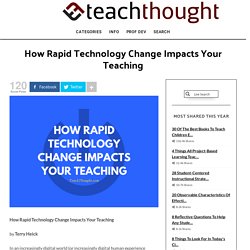

Educators as Social Networked Learners. This fall, I am getting the opportunity to design and teach a graduate course for Boise State University’s Education Technology Program entitled, Social Networked Learning.

The majority of students in the program are K-12 in-service teachers who are seeking ways to enhance their teaching with integrated and emerging technologies. I am so excited about what students are producing for this course and in terms of meeting this goal that I wanted to share information about the course, a sampling of course activities, and example student work. The Must-Have EdTech Cheat Sheet. Explania: A Useful Source For Free Educational Videos 2.86K Views 0 Likes Whether or not you prescribe to the idea that there are different types of learners there are some scenarios in which a visual explanation is extremely helpful in understanding the subject matter at hand. Why Teachers Want Technology (And Why They Can’t Have It) How Teachers Can Best Use Education Technology 1.69K Views 0 Likes Edtech isn't the final solution for education's problems. 50 Education Technology Tools Every Teacher Should Know About.
Technology and education are pretty intertwined these days and nearly every teacher has a few favorite tech tools that make doing his or her job and connecting with students a little bit easier and more fun for all involved. Yet as with anything related to technology, new tools are hitting the market constantly and older ones rising to prominence, broadening their scope, or just adding new features that make them better matches for education, which can make it hard to keep up with the newest and most useful tools even for the most tech-savvy teachers.
Here, we’ve compiled a list of some of the tech tools, including some that are becoming increasingly popular and widely used, that should be part of any teacher’s tech tool arsenal this year, whether for their own personal use or as educational aids in the classroom. Social Learning These tools use the power of social media to help students learn and teachers connect. Learning Lesson Planning and Tools. 24 Ed-Tech Terms You Should Know. If you’re a teacher or administrator who has been to an educational conference or sat in on a product demo featuring the latest classroom innovation, you know that the intersection of schools and technology is littered with buzzwords. From mLearning to mobile apps to asynchronous instruction, the ed-tech landscape is equal parts high-gloss marketing and roll-up-your-sleeves instruction.
In the face of increased pressure to improve student performance, how can K–12 educators cut through the promotional hyperbole and put the focus where it should be — on classroom improvements? It helps if you speak the language. This Ed Tech Cheat Sheet, which we first encountered on the Mr. G Online edublog, features 24 frequently used terms that teachers and other educators can reference when wading into discussions about the latest trends in educational technology.
7 habits of highly effective teachers Always Prepped Blog. C’est quoi un bon prof? La question est simple, la réponse plus compliquée.

J'ai pourtant allégé ma tâche en ne demandant pas : "C'est quoi un très bon prof ? " J'imagine que le prof exemplaire n'a pas recours à la stratégie d'évitement. Je vais néanmoins, me laisser tenter par elle. Commençons par préciser ce que n'est pas un bon prof. On imagine que le "pas bon prof" est souvent absent, qu'il est en retard sur des programmes qui l'intéressent moyennement et il a tendance à penser que si cela ne se passe pas bien, c'est uniquement de la faute des élèves. Cet enseignant a tout intérêt à reconsidérer sa position et développer ses capacités d'écoute.
5 Ways Rapid Technology Change Impacts Education. How Rapid Technology Change Impacts Your Teaching by Terry Heick In an increasingly digital world (or increasingly digital human experience anyway), rapid technology change is a fact of life.

And these threats aren’t limited to business disruption, the safety of your data, or the digital footprint of your children. This kind of change also introduces significant threats to education. There is likely very little that can be actively done to reduce these threats on a macro scale other than impact them financially as consumers, as they are first economic issues. But we can begin to understand them better as teachers. 1. Rapid technology changes increases the need for persistent, informal ‘PD.’ Technology policies, teacher growth plans, and even department structures are impotent against this rate of change, and this degree of fragmentation. This makes the curiosity and professional diligence of the educators themselves supplant notions of top-down professional development. 2. 3. 4 Ways To Stop Being Scared Of Online Learning. We live in the Digital Age in which many of us spend a great deal of time each day using technology.
Most of us are connected via a mobile device of some sort as we move through our daily routine, and we make use of electronic communication options, such as email, social media, and text messaging. There is an increasing number of us who are telecommuting, working our full-time jobs from home. We have even defined ourselves as “digital natives” or “digital immigrants” to help explain this brave new world. Within this context, education has embraced the move into technology as much as possible. For example, online learning has been around for over a decade already. Within this context, my colleagues and I have noticed something interesting: Our online students seem even more intimidated by e-learning than in the past.
Preterm Information With technology often comes the ability for students to self-enroll in classes. Relevant, Functioning Content.